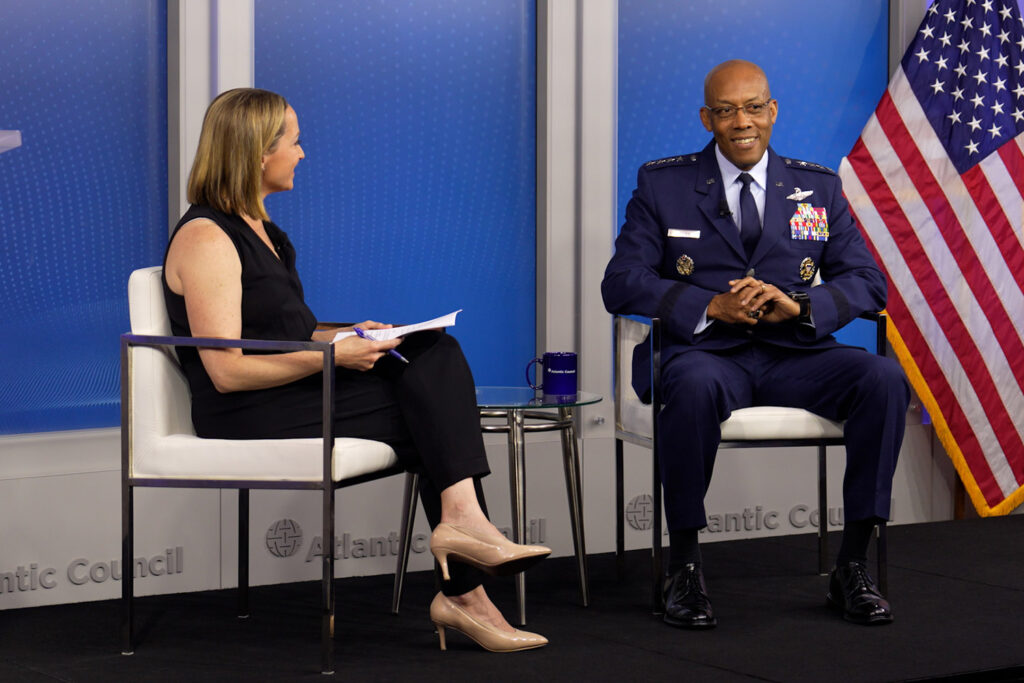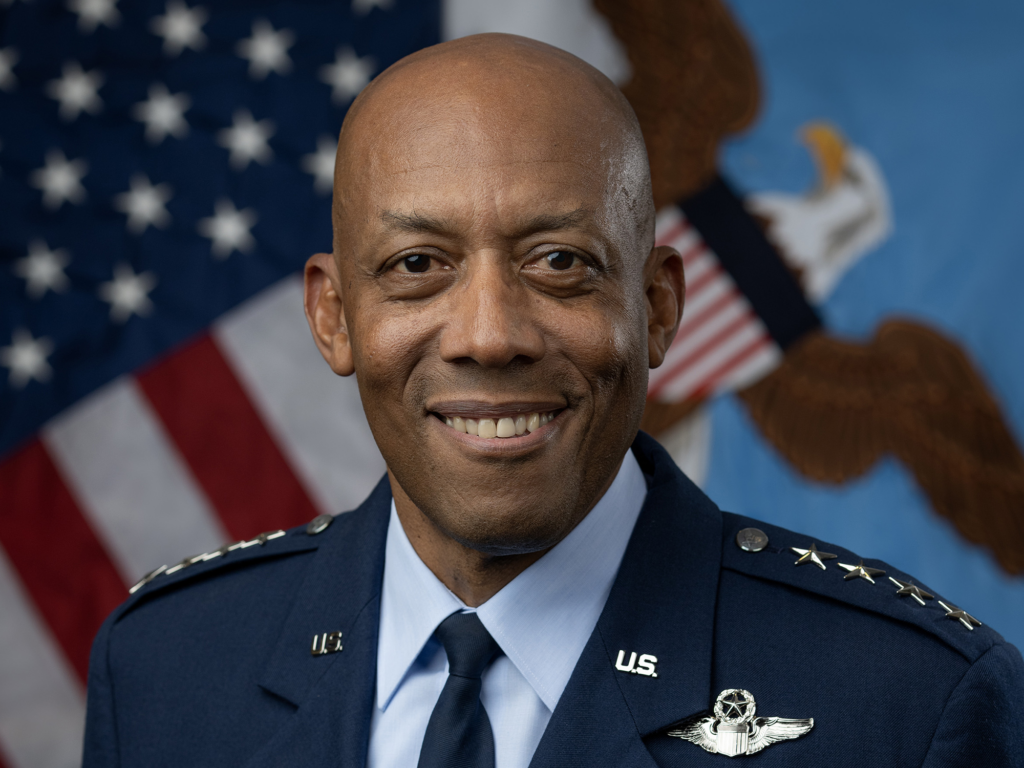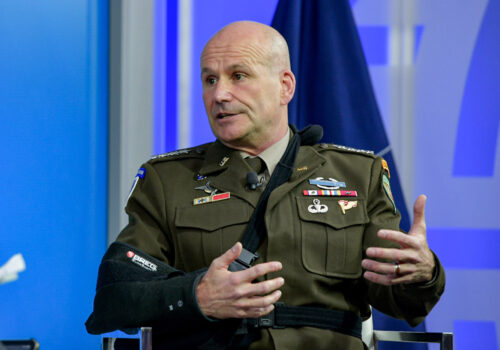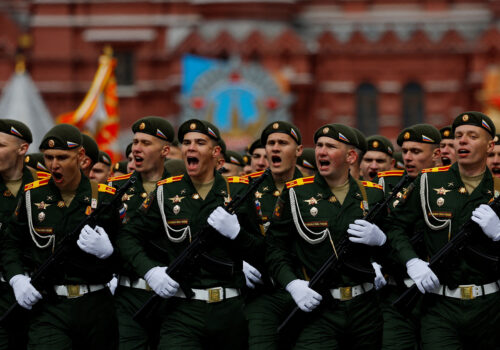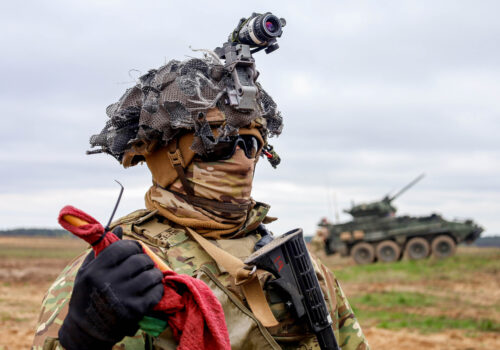Watch the full event
It’s time to plan for the long term in the Middle East, said General CQ Brown, Jr., chairman of the Joint Chiefs of Staff.
“What do we collectively want this to look like years from now? That’s the work that has to start,” he continued. The general spoke at an Atlantic Council Front Page event, which was also part of the Forward Defense initiative’s Commanders Series, sponsored by Saab.
Brown explained that this forward-looking planning will need to involve “a number of different nations,” including both their militaries and diplomats.
Asked about the United States’ role in the conflict, Brown said that the US military would “not necessarily” be involved on the ground to help with security. “You also have to think about who’s best . . . to actually work the details on the ground, [who] has the working knowledge,” he said.
But he said the US military could leverage experience gained in other situations around the globe to help the postwar process. “We’re always willing to do that to help make it as smooth as possible,” he said.
Below are more highlights from the conversation, moderated by NBC News National Security and Military Correspondent Courtney Kube, during which the general spoke about the Middle East, Ukraine, Africa, and beyond.
Addressing crises in the Middle East
- Brown said that as Israel was planning its operations in Rafah, the United States asked Israeli leaders to account for the civilian population by providing food and shelter. “I’m not sure how much of that’s come together, but a good portion of the civilians have actually moved out of Rafah,” Brown acknowledged.
- Last week, the US military put into operation a humanitarian aid pier—a Joint Logistics Over-the-Shore (JLOTS)—off the coast of Gaza. Thus far, Brown said, the military has brought “over six hundred metric tons into the marshalling yard” and that “some of that” has left the yard for Gaza, where aid organizations will distribute the assistance.
- On Tuesday, the Pentagon said that none of the aid thus far unloaded from the pier has made it to the Palestinian population. “We’re going to make sure we connect the dots,” Brown said, adding that the aid organizations have been working through immense security challenges. Nevertheless, he said he is “pleased” with how the delivery is going so far.
What’s next in Ukraine
- Nearly a month after the passage of the US supplemental spending package for security priorities, Brown said that equipment is already moving to Ukraine. When there was “movement” on the Ukraine aid bill ahead of passage, Brown said, “we started posturing ourselves . . . to respond when called upon.” He said there’s now a “constant flow of capability.”
- Ukraine’s leaders have complained about restrictions on using US weapons and equipment to attack inside Russia. Brown said that the United States and Ukraine will “continue to work through those details,” adding that Ukraine does have capabilities to attack Russia—they just can’t use US tools to do so. Nevertheless, he said that he doesn’t think one weapons system “is going to be the magic thing that is going to turn the tide” in the war.
- With NATO reportedly considering sending troops to Ukraine to train forces there, Brown said that he doesn’t see that happening while it is an active combat zone. “I do expect,” he said, “when this conflict is over that we will have an opportunity” to return to the training and coordination seen before the war.
Surveying global threats
- “When you have a conflict in one part of the world, it doesn’t actually stay in one part of the world,” Brown warned. “The goal here is to make sure it doesn’t spread and make sure we deter any broader conflicts.”
- Pointing to the Biden administration’s National Defense Strategy, released in 2022, Brown said that Washington is closely watching five main challengers: China, Russia, Iran, North Korea, and violent extremist groups. “They’re all active in some form or fashion and in some cases,” such as with China’s support for Russia’s defense industrial base, “[are] working together.”
- On Tuesday, the Pentagon revealed that Russia likely launched a counter-space weapon into orbit last week. The launch shows how the space domain “is much more challenging today” than even a few years ago, Brown said. “Naming space as a warfighting domain was kind of forbidden, but that’s changed . . . based on what our adversaries are doing in space.”
- With the United States preparing to leave Niger by September, Brown said that the Pentagon is “adjusting” its approach but that he expects the United States will be able to accomplish its counterterrorism objectives in the region. “We’ve got to have willing partners, and in this case, there were some things where we didn’t actually see eye to eye,” he said, adding that now, with the departure, “there are other opportunities for those that want to work with the United States.”
- “US leadership is still watched, and it’s wanted. [That] doesn’t mean that it’s always going to be a smooth road everywhere we go,” he said. “But I think in the big scheme of things, we can get and meet the objectives . . . set out by our national leaders.”
Katherine Walla is an associate director on the editorial team at the Atlantic Council.
Watch the full event
Further reading
Fri, May 17, 2024
NATO must ‘win up front but be ready to win long’ in modern warfare, says General Christopher Cavoli
New Atlanticist By Katherine Golden
At an Atlantic Council Front Page event, Cavoli spoke about the war in Ukraine, NATO's modernization efforts, the China challenge, and more.
Tue, May 21, 2024
Ukraine’s Western allies should fear Russian victory not Russian defeat
UkraineAlert By Peter Dickinson
Ukrainian President Zelenskyy says his country's allies fear the potential geopolitical consequences of Russian defeat, but Russian victory is a far more realistic and alarming prospect, writes Peter Dickinson.
Mon, May 6, 2024
Dispatch from Vilnius: Allies still waiting for the ‘Long Telegram’ from Washington
New Atlanticist By Andrew D’Anieri, Doug Klain
US and European policymakers should learn from the urgency with which frontline nations regard the threat of a Russian invasion.
Image: General CQ Brown, Jr., speaks at the Atlantic Council on May 22, 2024.
